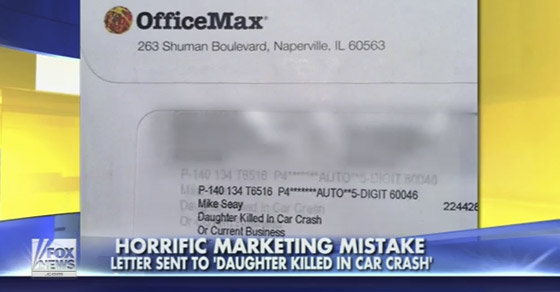Can marketers have too much information about their prospects?


The era of data mining comes with legitimate questions about ethics and privacy…
Over the past year, privacy concerns have received an abundance of press. Whether it’s Facebook’s not-exactly-foolproof privacy settings showing your personal shenanigans to your future employer, or Google deciding to use your product feedback history to enhance ads to your friends and family, we’ve all heard horror stories about online privacy.
The internet has made it very simple for just about anyone to collect data on a subset of users. If you’re a smart marketer, you’re already putting these data collection practices to good use; capturing your user’s email address, or getting them Like your Facebook page. The reason is simple: the ability to market to an individual after they’ve left your website. That’s step one; and for most people it’s enough. The ability to quickly communicate with your list via email or social media is often the cheapest, easiest way and that’s where it ends. Getting mailing addresses is the next logical step and gathering that information from your list can be done in numerous ways.
5 years ago, that would have been fine for the vast majority of companies. The ability to send out a massive amount of mail or emails was enough. Move forward a couple years and businesses began to understand segmentation and started sorting their lists by age, gender or zip code, etc. The simple stuff.
Enter the era of Big Data. <-- super scary capitalization!
We now live in a time when having access to someone’s email address just isn’t enough. Add in the fact that virtually everywhere we congregate or shop—both online or offline—we leave digital footprints. Whether you use a loyalty card at your grocery store or publicly post about your love for pet costumes, you’re leaving a trail for data mining companies.
The vast majority of people don’t realise that when you shop with a loyalty card, the store is collecting all sorts of information about you: what things you buy, what coupons you use, etc. It allows them to custom tailor coupons and offers specifically for you. You didn’t think that 30% off coupon for pet scarves was just you having a lucky day did you?
Enter the (VERY REAL!) privacy concerns.
There’s always two sides to an issue. For most people, letting a store track their purchases is a low cost for getting cheaper goods and besides, it lets them feel like they’re “beating the system.” The other side is what happens when data mining gets personal.
There’s two examples of data mining that come to mind:
Target determines that a teen is pregnant before her parents found out. This is actually a very simple process of pattern recognition of past and current purchases. A simple algorithm created a “pregnancy prediction” score:
“As Pole’s computers crawled through the data, he was able to identify about 25 products that, when analyzed together, allowed him to assign each shopper a “pregnancy prediction” score. More important, he could also estimate her due date to within a small window, so Target could send coupons timed to very specific stages of her pregnancy.
“One Target employee I spoke to provided a hypothetical example. Take a fictional Target shopper named Jenny Ward, who is 23, lives in Atlanta and in March bought cocoa-butter lotion, a purse large enough to double as a diaper bag, zinc and magnesium supplements and a bright blue rug. There’s, say, an 87 percent chance that she’s pregnant and that her delivery date is sometime in late August.”
Sophisticated technology, using very simple patterns to determine who might be pregnant and then sending them special offers. For one family, it led to the parents getting suspicious about the specific coupons they were sending their daughter. Turns out, Target was right and the parents were none the wiser.
OfficeMax sends direct mail to father of “Daughter Killed In Car Crash.” In this instance, OfficeMax, like thousands of companies, purchased a third-party marketing list. As it turned out, the list had accidentally merged in a note about his daughter having been killed in a car crash into the “Address 2” field, leading to what appeared to be a horribly insensitive mailer.
This led to the consumer and pretty much everyone else, wondering how this could have happen AND why does a marketing company even care enough about a family death to attach the note to their account record.
I view both of these as cautionary tales. The second example brings up a very good question about ethics in data collection: is there a real use for the type of information that was exposed by a faulty contact record and merge field? The answer is probably yes. There’s probably very good and normal reasons why a company would collect that kind of information. But that’s looking at it from the wrong angle. The right view is that companies are collecting literally everything about everyone.
In our infinitely connected world, where computer programs can scrape information from news articles, Facebook and Twitter posts, anyone can put together a digital profile about you. I tend to view the data collection as amoral. It’s what we do with that data that matters.
In the era of big data, it’s becoming very easy to connect with customers in a very personal, targeted fashion. While this is great for driving sales messages that work at the individual level, we have to remember that there’s an actual individual behind the data.
When it comes to technology, mistakes will always happen. It’s our job to ensure that we fully understand the technology that we’re putting in place and the companies with which we’re doing business. Ensuring that we hold our vendors to the same ethical standards that we hold ourselves to, is an absolute must in this brave new world. <-- super scary reference
On a lighter note: if you’re reading this, you’ve already been tagged by Google Adwords. You might even see some Tech Guys ads following you around the internet. Enjoy!
